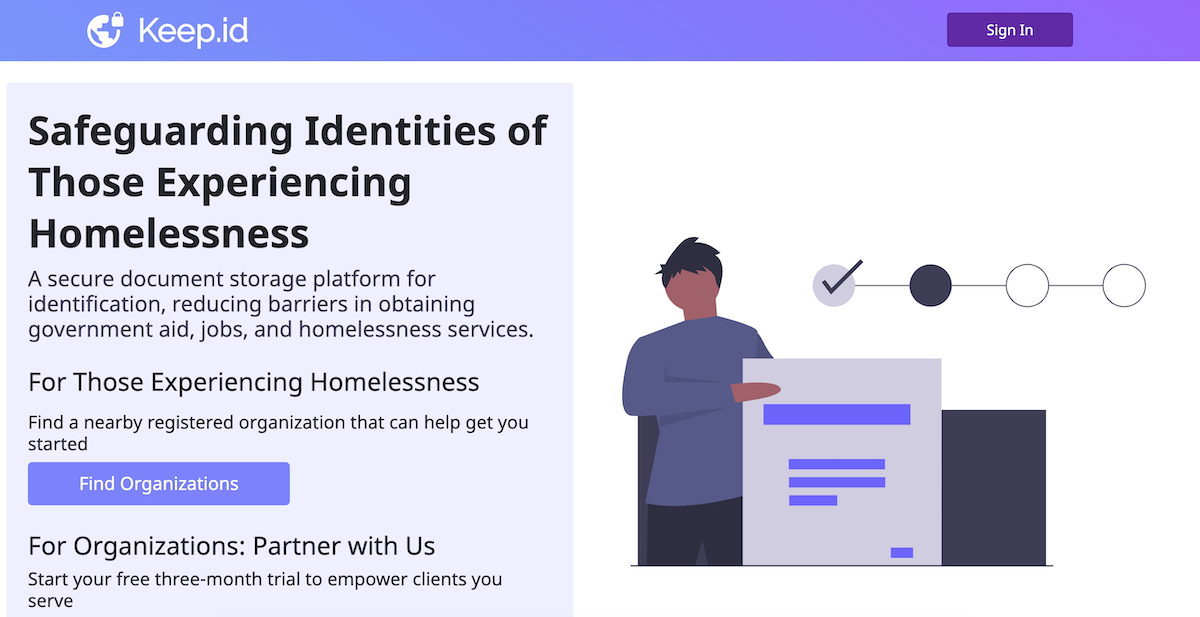A group of rising third-year law students at the University of Pennsylvania have teamed up with engineering students to create two tech-focused legal projects to be used by underserved communities navigating legal issues.
One project, a digital lockbox of sorts, will operate inside Broad Street Ministry (BSM) and be able to hold important documents like a birth certificate or medical records for housing insecure people. The other is a collaboration with Community Legal Services (CLS) on a form that would walk users through tricky tax law documents to see if in-person legal advice is needed.
The students work closely with Professor Cynthia Dahl, director of the Detkin Intellectual Property and Technology Legal Clinic, where she and students collaborate with startup founders on a variety of needs.
Zachary Furcolo and Maria Tartakovsky, both third-year law students with tech backgrounds, have spent the last academic year working on a guided interview project with CLS. The project is designed to help at-risk populations, like veterans or seniors, with property tax burdens.
“In talking with CLS, we found out that people in these populations often come in when they’re about to get evicted, and CLS was looking for a way to get them enrolled before that happens, in a way that wouldn’t force them to take off work and come in,” Furcolo said. “These forms and procedures can sometimes get a little complicated to fill out at home.”
The tech behind the Property Tax Abatement Eligibility Survey — aka the PhilaForm — helps a user fill it out, asks questions and reminds them about documents they might need. It will also alert a user if they’re eligible for a number of tax programs. The tool itself is done, but the team is currently working with CLS and the engineering students who built the tool to vet it before rolling it out to the public.
But the group realizes there’s work outside of creating the tool, Tartakovsky said. They also intend to target individuals or communities that could use the tool and promote it so that the public knows it’s available to them.
The group brought their project to the Iron Tech Invitational, a Georgetown University-based tech competition for the legal field. They didn’t win, but it was a great experience to see that what the group thought was a niche area was actually being invested in by people across the country, Furcolo said.

“I do think AI in the legal space is looking pretty beneficial for lawyers,” Tartakovsky said. “It’s important to make sure attorneys have access to relevant information, and the variables in place to help their clients. I think tech is proven to be prevalent in the legal space.”
Another group of Penn students also created a project with Iron Tech standards in mind, although it didn’t end up competing. Rising third year law student Matthew Copeland worked with a group of law and engineering students to develop a digital lockbox called Keep.id for BSM. Guests who use the nonprofits services could upload and have a place to store important documents so they wouldn’t have to carry them around.
Copeland’s role involved learning data security law, which he said is ever-evolving in Pennsylvania. Currently, the project is being worked on by 13 independent contractors, all students or recent grads, from universities across the northeastern United States.
“Having incorporated and secured an interest amongst our customers to beta test the product, we’re in the process just now of establishing a bank account for our organization and of setting up the nonprofit-focused (donations-focused) pages of the website,” said the project’s comms lead, Jackson Foltz.
Copeland said learning about the securities involved, like how the tech could be HIPAA-compliant, was difficult.
“But it’s worth it having the guests have something to call their own, even if it’s digital,” he said. “It’s work well worth it.”







